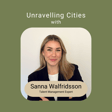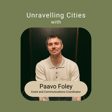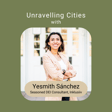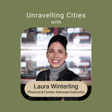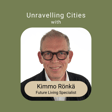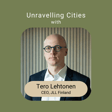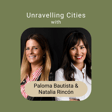Become a Creator today!Start creating today - Share your story with the world!
Start for free
00:00:00
00:00:01

Shaping Sustainable Urban Development through Digital Innovation
We cannot think about real estate as we used to, since we need to live within the restrictions of our planet. What if we adopted the thinking from consumer-led industries into city development? What would this mean to the liveability of our cities?
In this episode, we delve into the dynamic intersection of digital innovation, sustainable practices, and community engagement within the real estate sector.
Transcript
Introduction of Sami, an Expert in Sustainability
00:00:18
Speaker
Welcome. I'm Natalia Rincon, and welcome all to Unraveling Cities Podcast, another episode. And my guest today is an expert in sustainability, rebuilding, digitalization of the built environment. And he has an interesting background in associations, consulting, also as a DJ, I remember.
00:00:45
Speaker
And now he works as a head of innovation and city-wise. So welcome, Sami. I'm very happy to have you here.
Sami's Early Career and Globalization Education
00:00:53
Speaker
Yeah, excited to be here. Fun to have some time to chat about what's happening in the cities now or in the future. Yeah, are we in the future? Nice. But tell me a little bit about yourself. I mean, you can tell me a bit of your story and why is this area interesting for you.
00:01:13
Speaker
Yeah. Hmm. I kind of started my working career in an association called was it all your new and it was a bunch of like hyper intelligent hippies thinking about kind of making the world fairer to a lot of people kind of resolving the injustices of the world through fair trade.
00:01:38
Speaker
and this kind of internationalization and globalization education. But fair trade, not the trademark, but the concept was in the core idea of this association. And that's where I kind of developed a lot of my worldview of how things should work and why sustainability and responsibility.
00:01:58
Speaker
is a key matter of survival to any business or the entire society. And then kind of finalizing my work there in those projects, I was finalizing my studies, my business studies at the Turku School of Economics.
Work with Green Building Council Finland
00:02:15
Speaker
And there was this opportunity to join a small association called Cream Building Council.
00:02:23
Speaker
that had just been founded. And I thought that, okay, this is a space or an industry that is not that well-known about the business side of things, at least kind of new business development and different types of business models beyond project work.
00:02:44
Speaker
And then I thought that, OK, maybe this is a space where kind of my knowledge of sustainable business, combining sustainability and business knowledge and marketing and economic geography, that is my background, could be taken into use of something good.
00:03:02
Speaker
And then I joined Green Building Council Finland. And then there we work to establish the very core foundation of what Green Building in Finland is known today, working very closely with the companies that were pioneering this movement.
00:03:18
Speaker
and development, but also working super tightly side by side with the Ministry of Environment, core team and experts at that time. How long ago was this one?
Technology and Construction: The RecoDeck Community
00:03:30
Speaker
This was 10 years ago, a bit over 10 years ago. So the Green Building Council was established more than 10 years ago already, before we had all these trends. So what did you do after then?
00:03:44
Speaker
Yeah, so at that time already, we were concentrating on CO2 calculations, common framework for kind of assessing the building performance or building performance regarding sustainability, but also things like remortgages.
00:04:00
Speaker
And at that time I kind of discovered that there's no link between the technology development or technology companies and the construction companies. So then we established a RecoDeck community and event next to Slosh. And that was kind of when I started working more and more on the digitalization side of things.
Experience at Gaia Consulting and Kirahub
00:04:21
Speaker
And I decided that I want to have a bit of a look outside the industry
00:04:27
Speaker
I went to Gaia consulting, my management consulting team, and one of the leaders in sustainability consultancy in all of Europe, focusing on real estate and construction, but more so on the kind of impact valuation and impact evaluation and impact communications regarding sustainability, working with aviation, food. Yeah, different industries here. Yes, energy. And then I got a call, I was invited to join the Kirahub team,
00:04:56
Speaker
Long story short, GitHub is an association posting sustainable digitalization of the build environment. And our job with the enormous team of three people was to make sure that Finnish real estate and construction industry, one, digitalizes, two, does it sustainably. Yeah. And then I worked for that for three years, consulting 50 to 60 companies annually.
00:05:23
Speaker
doing work for the Finnish Common system for building core information, known as RIFTY today. And then I was invited to join C device. Yeah.
Transition to C device and Implementing Innovations
00:05:36
Speaker
And then I decided that I've been waving my hands like a good consultant should for 10 years and talking the talk.
00:05:45
Speaker
So maybe I should now join a one company and walk to talk as well. Yeah. That sounds very interesting. I mean, you went from, I love these like hyper intelligent hippies to a corporate guy. Yeah. Hell yeah.
00:06:00
Speaker
No, but I'm still a nerd and a hippie and I'm somewhat of a actor. Maybe I ask you like these because this is quite interesting. I mean, you're already like participating in forerunner associations or companies or movements.
00:06:19
Speaker
that are pro sustainability and wanting to make a change. But I will ask you this, like, what bother you like 10 years ago? And what bothers you now, like in the industry, you know, so has it changed? A lot of the things have changed.
Industry Shift: Sustainability as Core Strategy
00:06:36
Speaker
I used to have this talk 10 years ago, when I was kind of pitching the idea that in 10 years, we will have nothing else but cream building. And
00:06:46
Speaker
A lot of people were laughing at me, like you are naive, you are young, you are kind of idealistic. And looking at that discussion today, where we are, for example, in the Netherlands, Palafnendam, one of the biggest construction companies, decided that they will scrap their business strategy because their sustainability strategy going forward is their business strategy. So we've gone through this development in 10 years.
00:07:15
Speaker
Tremendous change. What bothers me still is the core understanding that sustainability, like digitalization, is business. It's better business when you take this into account. It's nothing new. It's not an add-on. It's a true transformation of the business itself.
00:07:37
Speaker
And same with innovation, it's risk management more than anything, if looking from that perspective. Same with digitalization, you need to understand the intricacies of those development paths and how you take that in the core of your company and to the core products, whether they are projects or design services or whatnot.
00:07:59
Speaker
And you mentioned these that it still bothers you. So it seems that in 10 years, it hasn't changed the mentality that actually building green is good for your business. Oh, it has. We went from rejection to kind of interesting to understanding it. Okay, how it works. And now we are pulling it
00:08:24
Speaker
to work.
Lifecycle Thinking in Real Estate
00:08:25
Speaker
We are finally seeing new business models, new services that have sustainability and kind of throughout digitalization, all of these components inside them.
00:08:37
Speaker
Yeah, yeah. In 10 years, I wouldn't have expected that the biggest Finnish technical consultancy that CTVISE is, that all of the new services coming out of our business development are actually sustainability services. 100% of what we are developing are sustainability services.
00:08:56
Speaker
Yeah, yeah. So this was 10 years ago. This is what you're speaking. I also studied architecture like much more years ago. And it was like facing sustainability. You know, we were studying like passive houses, which were like, we didn't need all these HVAC systems and so on. So the architects, like which is like the architecture practice, a very, very old practice.
00:09:22
Speaker
understood already all the benefits of climate, of locality as well, build with local materials, ventilate the houses, you know, and be like with the nature in a way. So that's how architecture started, like we started living in caves. And it seems that the industry has exploded into these like efficiency, you know, of creating and creating and producing, you know,
00:09:51
Speaker
whatever it is at the lowest price. Now the stages that you were describing seems to me it's like grieving a process.
Regenerative Societies in Urban Planning
00:10:01
Speaker
The industry has been grieving for a while. First rejection and then crying maybe a little. And then now it's an acceptance phase. Yeah. In the building environment industries, we lost the business that we had.
00:10:17
Speaker
Exactly. Already years ago. Yeah. I love that. Like we've lost the business we have. So what was that business? It's like this production at the cost of anything or. Yeah. Simply making money. Yeah. But isn't that how the, this is a long criticism to the industry, but isn't that what everybody's saying that real estate is a very good industry to be in. You create a lot of money and now it's basically killing the old business. So.
00:10:46
Speaker
How do you think moving forward with this paradigm change? Well, the perspective has changed. The timeline has changed. The concept of making money has evolved into making money today into this kind of lifecycle, thinking of how much we actually make money throughout the entire lifecycle of a building, for example, or infrastructure asset.
00:11:13
Speaker
So now we take into account the fact that we cannot take loan from nature or the society to build something and gain monetary benefits now without paying it back at some point. Yeah, so the return of investment may be longer but higher.
00:11:34
Speaker
but also the kind of framework of what is calculated in that ROI calculation has differed. For example, looking to the kind of upcoming legislation and steering work from the EU, if you are not assessing sustainability and the future use cases of a plot, for example, and you cannot sell it if you are not
00:12:03
Speaker
securing it from kind of enduring biodiversity or natural values of that plot in the future. If you are only kind of destroying them, then you cannot sell it in the future. Yeah. So it changes completely the ROI calculations. So the characteristics of our location have changed. Yeah, exactly. Like what we understand is like a good business or a good location completely changed now. Exactly.
00:12:32
Speaker
And this is an interesting word you use biodiversity. So even if we would be able to calculate biodiversity by location and map it, like how interesting that will be, you know, like what are all these organisms, either like plants or animals, like feeding into the ecosystem and how is this becoming like richer in the future?
Biodiversity in Urban Environments
00:12:55
Speaker
Yes.
00:12:55
Speaker
So yeah, so we need to calculate in the same way that we do climate or carbon footprint calculations, we need to do biodiversity footprint calculations. And same with all of the kind of different natural values. Yeah, I like that. Usually we forecast based on financials. But if we could forecast as well biodiversity, you know, like how much how many new plants or floral fauna
00:13:23
Speaker
Are you going to have in that location? That would be amazing. Or even if you are destroying these values inside that plot, it changes your calculation of the future estimated value of that plot because you might not be able to resell it.
00:13:39
Speaker
Yeah, but now we're speaking about, this is interesting, now we're speaking about not harming, you know, like you can't lose because of course we're against this fight of climate change, right? So the whole rhetoric is that don't harm, don't lose. But has anyone been speaking about producing new? I mean, is our mindset there, like recover what we have lost?
00:14:07
Speaker
Yeah, yeah. And that's where I've been trying to introduce. Yeah, no, you can introduce it here. It was magnificently done in Helsinki's Anama newspaper last week. And it's not only me, it's, for example, Matti Kuttenen from Ministry of Environment. I'm sure that he's been talking about this a while ago. And I regard him as one of the pioneers of all of this movement. And probably I
00:14:34
Speaker
took it from from him as well. But this was something that was bubbling under already somewhere eight years ago, with the Green Building Council movement, the World Green Building Council community, that we need to start talking beyond carbon. Okay, then embedded carbon, but going even beyond that and talking about regenerative societies, regional regional that build environment.
00:15:05
Speaker
So not only we are not making harm or minimizing the harm if we need to harm, we are minimizing the harm. But the same with the climate compensation. We need to think about ways of if we make harm in this part of the life cycle of, let's say, part of the city. We harm the biodiversity.
00:15:28
Speaker
but then we need to start, regenerate back the biodiversity or compensate it differently in different areas. Can you give an example of that? Yeah, so the idea is that if there's certain values that are assessed to be in a part of a city, and we have still decided that we will build a school or an office building there,
00:15:57
Speaker
We need to make sure that the same amount of these natural values exist in the future in that local area. Or maybe globally. That's a different case. But in biodiversity, it needs to be more local. Yeah, absolutely. Because the effects are more local. Yes. So we need to build the buildings in a way that we need to start understanding that how we
00:16:22
Speaker
How we then in the construction phase build something that regenerates these natural values as part of the building, for example, or then kind of planting new plants in the area.
00:16:40
Speaker
Yeah, and local plants as well. I've seen a lot of different projects where you put these like, plants that are not part of the ecosystem. And then there's a lot of maintenance going on. Or when we see also these grass, like overall, when we are cutting forest and just putting lawns, that's also very harmful. That's why it doesn't create any biodiversity. Yeah, we shouldn't have lawns. Yeah. So, okay, that's very interesting.
00:17:15
Speaker
Now, when you were in Kiroha, you were exposed to a lot of different projects and ideas and trends. What are the mega trends now that you can say are going on at this moment in the build environment?
Digitalization Trends in Urban Planning
00:17:29
Speaker
Well, I think the whole idea of regeneration is something that is coming up. That is something that, for example, blocks hub in Denmark, of course, it's always the Danes that are pushing these things. Setting the example. Yeah, they took the whole circularity and kind of combined that buzzword.
00:17:50
Speaker
with regeneration. And that's very wise of them because they have the position and the backing from these very prestigious organizations, foundations that run Denmark. So kind of introducing that lingo to them and saying that this is cool, it changes the whole industry. And probably us in the Nordics, we look
00:18:16
Speaker
to Danes to kind of take these new wins of development. So I think that's one thing. One interesting mega trend is that in the phase of digitalization in the build environment where we have started to experiment with these new gadgets and tools and kind of point solutions. And now we have finally understood that we need to kind of build our own tech stacks.
00:18:43
Speaker
that actually work for us. So we are not building our working ways, kind of trusting and kind of dependent of these point solutions. We first plan our digital way of working, and then we select the ones that generate the best architectural kind of gains for us.
00:19:08
Speaker
Yeah. So are you mentioning here, if I'm understanding right, that we shouldn't work in silos. For example, we should plan more like a long lasting digital innovations that are going to transform the way we're working, but also help us better. Yes. But first, in that sense, the clients of your solutions have finally understood
00:19:37
Speaker
why they need digital ways of working and digital tools. So it's not only to do one task, but it's also to kind of change the entire operation of the company. And it's not
00:19:51
Speaker
There are some things that the solution provider, for example, a SaaS company cannot change inside their client. There might be some systemic errors inside the organization regarding the IT or business processes that need to change to support kind of more embedded digital workflows and value extraction of these new services.
00:20:21
Speaker
I agree with that. I think that the solution that is long-term sustainable changing something, because we have had this in the past. And I think the ones that are really changing the way we are working are those that we can take right away in our daily life.
00:20:46
Speaker
Like you know they're helping us with the way that we have done the things but they're adding new and then at the same time they're adding new. They're transforming something that we were not doing right so then you become it's like adding on you know and then the transformation happens.
Systemic Changes for Digital Transformation
00:21:06
Speaker
Yeah, but it has been very irresponsible of the industry to kind of push that burden of this transformation to the tech companies providing services. It's not their job. It's the client organization's job.
00:21:20
Speaker
And I think that that's an interesting point. It's like, why is the industry so slow? I think it's because it's one of the industries that involves a lot of stakeholders, you know, where a lot of decisions have taken a lot of time to make. If we are speaking about urban planning takes like years, decades for that. So I think that we have been these like paralyzed, you know, in
00:21:48
Speaker
redoing or rethinking the way we're doing the things. Actually, I was in this podcast with one of our guests and she mentioned something really nice. She said that perfection doesn't get you to orbit. I'm not going to reveal who she is now, but you have to listen to our podcast.
00:22:08
Speaker
But I love that statement because we spend our lives trying to be perfect, especially in the real estate when there's a lot of investment, high investments and money involved, you know, and we are speaking about infrastructure that is heavy and it's expensive. So when we are trying to do the things perfect and go for the perfect decision, we just don't do it. We paralyzed.
00:22:32
Speaker
Yeah, that is true. Second, you asked about what bothers me. It's not bothering me, but it motivates me. It's the fact that coming from a business background, my whole thinking has been very contradictory to the built environment thinking.
00:22:52
Speaker
where in the build environment, we are producing completely unique products every time. So we are producing unique bespoke outcomes to a small set of clients. So we are not creating consumer products.
00:23:12
Speaker
Whereas my background, I come from the mindset of how do we design and produce something that we can sell to the masses. So it's totally opposite thinking.
00:23:25
Speaker
I love this. I love this because we have several guests, different backgrounds, all of them. And they all have come down to people. And I love how natural this is because you're mentioning now the consumer background, that in the build environment, we focus more in producing products.
00:23:44
Speaker
we're forgetting of the consumer. Who is the consumer of cities? It's people. At the end of the day, it's people again. I love that, again, when we are producing these new tech for the build environment and when we are focusing, where are the megatrends? It's satisfying the end-user. The end-user, the citizen, it's there.
00:24:09
Speaker
So yeah, please tell more about this. I love this. Yeah, I think the best example comes from the west coast of US. BJ Siegel, who was the guest keynote speaker at WDBE. I had the privilege of visiting their factory.
00:24:26
Speaker
in San Francisco last year. And, and Beaches Eagle is, is the kind of person behind the Apple Store concept. So their, their mindset of construction with their brand Juno is that they are taking the consumer product design and production methods to constructing apartment buildings.
Standardizing Housing Designs for Sustainability
00:24:48
Speaker
So they are kind of producing a Juno product. Yeah.
00:24:52
Speaker
or investors to buy and build Juno apartments. What is it attractive of these apartments? Do we actually need the thousands and millions of variations of apartment buildings? We don't. We don't want them. We want affordability and we want good quality. And there's a huge issue of affordable housing in the US.
00:25:18
Speaker
Yeah, and in the world, I would say Finland is facing that already. Yeah, exactly. So they are making sustainable, affordable, nice, very Nordic design apartments, apartment buildings. So packaging in a way that it's mainly affordable, quality design. Yeah. You know, those are the parameters that they start the design process with everything aligns with these parameters. Yes. So all of the designs
00:25:47
Speaker
All of the material uses all of the production methods from design to being built to being assembled to being delivered. Everything aligns with these principles, not starting from, Hey, we need to build something. Okay. This is the way we can build something.
00:26:05
Speaker
Okay, we have the people that can build that something. Okay, let's do it. And then forgetting that, okay, we actually did 10,000 of the same project last year, but this is completely different of any of them. So we are solving the same issues, project by project.
00:26:21
Speaker
where we should standardize a lot of the stuff like in the product mentality and product design, you standardize the things and you reduce the output to one product or three different tires of that product, but not say 100 different variations of the same 100 square meter building, uh, apartment.
00:26:44
Speaker
Yeah, and maybe just to add here like being a devil's advocate here as well, not everybody wants like the same style. So imagine that we all have the same
00:26:56
Speaker
Yeah, but that's on a different level on Maslow's hierarchy. Yeah, exactly. You want to live probably inside, that's first. So you're referring to, we don't need to produce so much, in a way, waste, because we're producing waste as well when we have so many options.
00:27:15
Speaker
Uh, we want to standardize that, uh, and we can still produce very beautiful citizen spaces like public spaces as well. So I actually was like watching this video yesterday or this week, uh, where there's these blocks, uh, Lego blocks, but bigger and with, uh, in insulation side. So these guys, like they were fast forwarding video and then you could see that it's like a Lego and you just.
00:27:45
Speaker
build a house in a day. I think that we should go more into that. At the end of the day, a house is a refugee. That's basically it. Having a unique bespoke building, it's luxury and it's enormous waste. We cannot think about housing or space.
00:28:12
Speaker
in that sense anymore because we need to live to the restrictions of our planet. It's the same with food. It's the same discussion that we have had with food for quite some time already. What is the amount of luxuries we can afford on our plate?
00:28:27
Speaker
And I think that real estate has really a big potential in transforming the whole industry. And even the strategy, like how we plan, like from the private side, from private companies, you work a lot with your customers right now. What would you say that they need to change the most right now? Because of course, even though the location as we know it has changed,
00:28:57
Speaker
The way that we choose locations, so when we start, you know, at the beginning of the cycle, when we start choosing a location, we are following the same criteria. But then when we arrive to the location, then we want to be sustainable and everything else. So in a way, the way we sort and plan the cities starts earlier than just finding a good location. So urban planning now, I'm speaking about urban planning.
00:29:25
Speaker
Yeah. And when you say finding a location, you are probably saying finding a new location. Both. Yeah. But in that decision making, my assumption and kind of looking to the steering that is coming and kind of keeping us safe from the climate crisis is pointing to a direction where we cannot have any new locations. We've already used
00:29:53
Speaker
all of the land area that we can use. I agree with that. So that already takes tremendous part of that decision making. You had two options, now you have one. Yes, yeah, like choose one that you can renovate and not even tear down, renovate. Yeah, exactly, because then you have the different type of steering coming down that you cannot actually build new.
00:30:25
Speaker
And you work a lot also with the public sector. So. Used to be more than now, but. Yeah. Okay. Used to. I have been working also. I have some experience with that. So usually like when the urban planning starts, like the idea, we look into new locations and we expand the CD and we forecast like who's going to be living there and so on. So, and it takes a lot of time to pass the whole plan.
00:30:54
Speaker
And then it goes through a lot of cycles, like in the, well, legally and politically. And then finally it arrives and then we start detail planning and so on. But I think that the whole process, I mean, it used to work when we had only paper, right? When you're drawing.
00:31:13
Speaker
But now when we are digital and things happen on demand and fast, what would you change in that process?
Leveraging Technology in Urban Planning
00:31:21
Speaker
I mean, now I'm asking you, like, how would you change urban planning, which is assigning the land. It's like even once before, you know, so how would you change that process based on your experience and all the technologies that you have seen? Like, what are we lacking there? How can we change that?
00:31:38
Speaker
Yeah, first, can you describe more about the fact that it used to work on paper? Yes. So what I mean is that usually these lots are assigned like where belonging to families, if we go very, very, you know, in history. And then when we started building municipalities and communities and we had this like
00:32:01
Speaker
Parcels of land and so on we started to make a test for plants and then approving in the city with a seal and okay this belongs to the sky and now the city will buy these where the city owns this land so it was a lot of like bureaucracy behind and there was a lot of paperwork involved and discussions and you know negotiations.
00:32:23
Speaker
But I think that life now it's faster. Decisions could be made that would push us quite fast towards our climate change goals or sustainability goals. So in my mind, this process could be much more flexible. Faster, flexible, it's not, you know, it's not so hard.
00:32:53
Speaker
Yeah. Well, even a lot of those decisions are very simple rules. And when you have simple rules, you can do calculations and assessments and compute them. Yeah. So why not compute the decisions that you already know how you make them and then leave room for understanding the concept, uh, context of those decisions, right? Yeah. Because probably what you are now saying, what I hear is, is that it's so fast that you kind of
00:33:22
Speaker
understand that repercussions of your kind of decisions when you're one person or one tick in that command chain. Yeah, exactly. And the other way is maybe utilizing the same mindset of the one planet thinking to urban planning as well. So now we are working with needs that pop up
00:33:49
Speaker
in timely fashion, year 23 and year 24. What if we do foresight studies for all of this for the future?
00:34:01
Speaker
towards the parameters that actually determine if we can sustain on this planet. So model the future and then work backwards. Yeah. I love that. I think that's one of the great pushes of technology here, computing a lot of different scenarios and simulations so we can foresee what's happening and then move backwards and say, hey, we are not going the right way.
00:34:30
Speaker
Yeah, I agree. I think that's like one of the biggest change maybe that urban planning will experience. Now with applied AI, I think we can do that as well. So yeah. And we need to be brave enough to give these boring tasks to computers because they love them. Yes. I also could give some of my boring tasks to computers. Yeah, I like this. I went just to
00:35:01
Speaker
kind of recap what we have been speaking. So you mentioned very, very interesting points here. So with your background, that is very, very much into sustainability and doing good for the world. One of the things that bothers you the most or has bothered you in your career is like that the core understanding of sustainability being better business is not there yet, or it's we're approaching, but not there yet.
00:35:28
Speaker
Yeah, but also the core understanding of modern business ways.
00:35:31
Speaker
Yeah, exactly. So that still has to change. So you mentioned that there is something, maybe like a flag, you know, through your career, and that we have to transform that now. You also mentioned something really interesting, that real estate has lost the business that we had, the built environment, has lost the business, now you're in this new form of business, and we have to reimagine how it would look like.
00:36:01
Speaker
Then we spoke about biodiversity or generating these new biodiversity locations and speaking beyond just carbon and emissions, but going forward. So you mentioned then two megatrends maybe in the industry. One is like regenerative environment.
00:36:27
Speaker
So making no harm producing, regenerating and being local. And then adopting digital tools that are disrupting the way that we are doing right now, our work. And more so becoming fully a digital industry.
00:36:50
Speaker
Yeah, yeah. So these two megatrends, I really like them. And then, like, very, very nice here that we have been, the build environment has been producing new products, but we have to remember the end consumer, which is people, citizens. So the consumer of cities, it's all of us. I love that. And I will use that probably in our next podcasts as well.
00:37:18
Speaker
But now I want to end this episode with like some rapid fire questions for you. I don't know that. Are you ready? I mean, are you ready to take this?
00:37:36
Speaker
I'm not, but I will take up the challenge. All right, so this is best thinking, all right? No. You have no problem with that. Yeah. My thinking always goes through questions, so it's hard when I come back with a question. Yeah, you have to remember these. These are quick. All right. So where's your dream place to live? Yeah, Finland and New York. Wow, very different. Yeah.
00:38:06
Speaker
Nice. No, I have to ask you why, but I will reserve that for later. Okay. Public transportation or own car? Public transportation first, but not own car. A car. Okay. Multimodal transportation. Would you rather live in the future or in the past? Future.
00:38:34
Speaker
Okay, so you... If we have one, then I want to live there. Summer or winter? This is the toughest because I love winter and I love summer. I hate fall, I hate spring. All right, so both. What motivates you the most?
00:39:02
Speaker
working with people easily. I'm still a dumb believer in the fact that I can actually make a change of the small kind of tools that I have. And you said that before we started the podcast as well, yeah. I still believe in people, even though that's a kind of weird thing to say, probably. Morning or evening? Evening. What advice would you give your younger self?
00:39:31
Speaker
Oh, this is the hardest question. Nothing? Nothing. Yeah. All right. So it just made mistakes. That's it. Live. Yeah. Just live. Pasta or pizza? Ah, pizza definitely.
00:39:48
Speaker
All right, cool. So yeah, these were all the fire fire questions that I had for you. You passed them really good. You belong to our kind of people. No, I'm kidding. No, that's not true. I love to hear these. I love the stories of all the guests that we have. So they're all so different and at the same time, we're so alike.
00:40:15
Speaker
But hey, Sami, it was a pleasure to speak to you always. Have you here. You're so innovative, and I love just these discussions. We can go for hours. But thank you for coming, for being here. It's a pleasure. Yes. Thanks for having me. Let's continue building chaos. Yeah, exactly. And for all of our guests, I hope you have enjoyed our discussion today, and keep listening to us. Yes, have a nice day. Bye.
